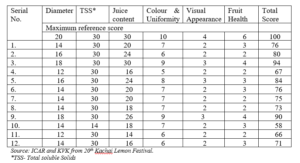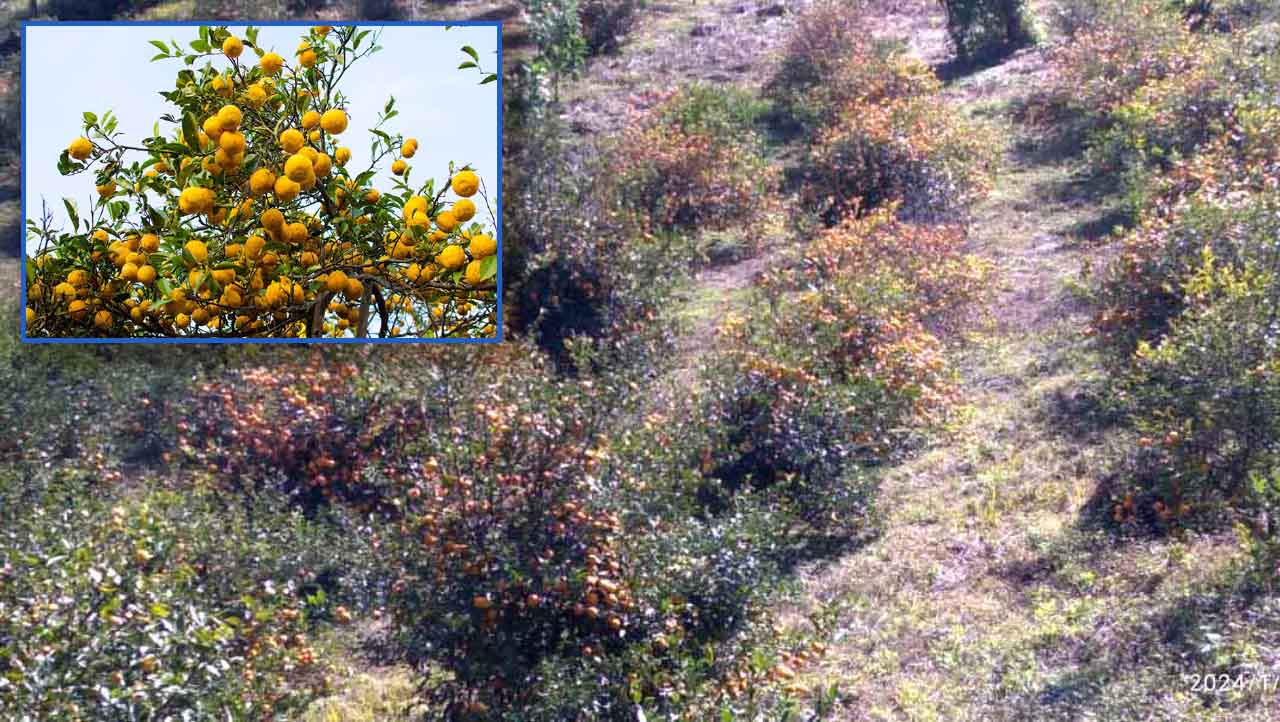Kachai village earlier known as ‘Kachui’ was resettled from the hill top to the present settlement in 1956. At present, it consists of three settlements namely; Kachai Hokhorim, Kachai Theikhor and Kachai Shimphungrim under a single administration. Located at 46 km West of Ukhrul District headquarters, Manipur state, India, the village is flanked by Hoomi in the East, Theiva in the north, Tingshong in the west and L. Phungthar in the south. It lies at the latitude of 25°14’29’’N and a longitude of 94°16’22’’E. The village is blessed with a sub- tropical climate with a thick fog/mist in the morning which appears from the month of late November to early part of February, providing the humidity to the plant. As per 2011 census, the village has a total of 510 household with a population of 2107, of which 1092 are male and 1015 are female.
The cultivation of lemon at Kachai village can be traced back to 1944, when one S. Paisho first planted the seed. Thereafter, lemon was grown as a fruit in the home backyard, with limited knowledge on modern farming, pest management system, nutritional and market values. In the late 90’s, production declined due to excessive intercropping, decrease in the quality of soil health, age-related and lack of irrigation. In January 6, 2005, the 1st Kachai Lemon Festival was celebrated; thereon the festival is celebrated every year marking the revival and transformation of Kachai lemon cultivation from traditional to modern scientific methods. The latest edition of the festival, i,e the 20th Kachai Lemon Festival was celebrated on 19th – 21st February, 2024. Celebration of this festival has gained Kachai lemon popularity and created a premium value in the market, and a boost to the growers. This festival also gives incentives and encouragement to the lemon growers and other farmers by giving them a platform to display and sell their products. Also in rural area where agriculture contribute significant part of economy, the availability and quality of agriculture education and training can have a profound impact on food security, poverty reduction and economic growth. Agriculture education also ensures that farmers have the knowledge and skill they need to produce high quality crops and livestock, protect the environment and improve their livelihoods.
As per the data provided by the Scientists and experts from ICAR, Imphal and KVK centre Ukhrul for judging the best Kachai Lemon during the festival a total score of 100 was given considering 6 parameters of the fruit: diameter (weighting 20 score), total soluble solid (weighting 30 score), juice content (weighting 30 Score), visual appearance (weighting 4 score) and fruit health (weighting 6 score). The average scores of the studied parameters (%) such as diameter, TSS, juice content visual appearance and fruit health in comparison with the total reference score were 73.3, 95.55, 66.33, 70, 56.25 and 45.86 respectively. The scientists and experts witness a significant increase in the quality of the fruits relatively compared to previous years products. The score point given by the experts from ICAR, Imphal and KVK centre, Ukhrul are shown in the table.

Health and economic importance
Kachai Lemon is the Pride of Manipur as it has been accorded with prestigious Geographical Indication (GI) No.466. The lemon fruit is unique as it contains rich source of ascorbic acid, 45-51 mg/ml juice, highest so far available in the realm of citrus fruits while other lemon varieties have only 20 to 30 mg/ml. Lemons are an excellent source of antioxidants including vitamin C and flavonoids that scavenge the free radicals form in the body. These health-beneficial compounds can help prevent disease and boost health and wellbeing. Besides health benefits, lemons are in preparation of desserts, drinks, sauces, pickles, dips and as a garnish for meat and fish dishes. Lemon juice is a natural cleaner and stain remover. Lemon oil is also used as ingredients in preparation of perfumes, soaps and skin creams.
Cultivation of Lemon is of great economic importance in kachai and surrounding villages as it provides employment opportunities. Extensive cultivation has a great potential for generating additional employment and thus will help to solve the problems of unemployment and under employment. It also provides opportunities to employ labours during the slack season. According to National Commission on Agriculture, the future strategy to generate additional employment should concentrate first on agriculture activities, and second, on non- agriculture rural activities. Besides this, cultivation of lemon provides an opportunity of improving food security, nutrition and human health, diversification of income, advance economic and social condition of rural poor. As compared to other field crops cultivation of lemon yield more return per unit area. It is also suitable for small and marginal farmer. Extensive cultivation of lemon plants can reduce pollution, conserve soil and water.
Challenges and opportunity
The challenges itself becomes an opportunity for the villagers. Diversification towards lemon cultivation and other horticulture crops and changes in cropping pattern on large scale production, integration of indigenous methods of production with technology and using of bio-fertilizers and bio-pesticides for sustainability are the main challenges of the farmers. The year 2023-24 witnessed a bumper harvest of Lemon in Kachai. According to Kachai Fruit farming & Processing Cooperative Society Ltd. (KFF & PCS Ltd.), the annual Lemon Production for the year 2023-24 is over 400 tonnes, but due to the lack of value chain many products were wasted. Development of Post harvest management system, establishing proper farmers support centre or creation of infrastructure and mechanisms for marketing horticulture products and expansion of research development and extension strategies for promotion of horticulture crops is a need of the hour. A committed policy and actions from the state government at this juncture will alter the course of kachai village from backward rural village to’ Model Village’ for other hill villages.

The writer is Asst. Professor, Department of Economics, St Joseph College, Ukhrul









